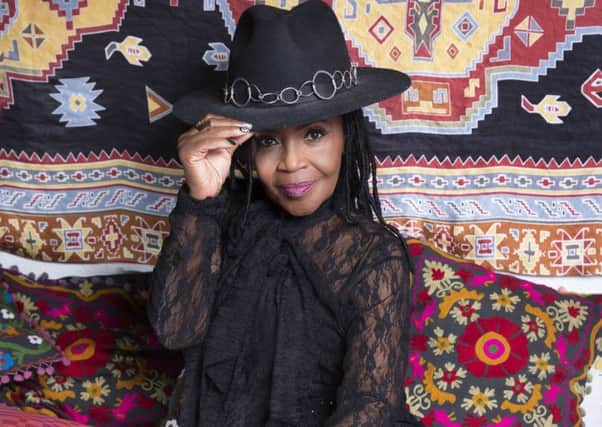Interview: PP Arnold on finally releasing her 'lost' 1960s recordings with Eric Clapton and Barry Gibb


“That relationship with Steve Marriott and The Small Faces has made me the Modmother,” she chuckles. “I’m a soul artist who was produced in the UK so I have a very unique British soul sound that’s very different from Motown or Stax. I brought my soul roots with me and planted my soul seeds here, and I’ve been out here as an independent artist trying to keep my vibe alive on my own through the decades.”
Arnold is determined to fill in the blanks in her long and varied career, starting with a new old album, The Turning Tide, comprising recordings she made in the post-Immediate years firstly with Barry Gibb and then latterly with Eric Clapton which she fought “tooth and nail” to recover.
Advertisement
Hide AdAdvertisement
Hide Ad“It was really important for me for this work to be released because it documents my development after the pop soul sound of Immediate,” she says. “The Eric Clapton production was really taking me back to my gospel, R&B roots and Barry, he’s the ballad king. I think it’s a good mix.”
Arnold is also poised to publish her autobiography, The First Cut is the Deepest, titled after her biggest hit. “I have a lot to say, I have a lot to tell,” she teases.
Born Patricia Ann Cole in Watts, Los Angeles, Arnold grew up singing in church but had no thought to be a professional singer until she was handed a way out of an abusive marriage by Tina Turner, who took her on tour as one of her all-singing, all-dancing Ikettes, arriving in the UK in the mid-60s.
“It was a day that changed my life,” she says. “When I came here with them, I was just a shy young woman singing as a way to support my children and get away from the abuse that I’d been dealing with. Destiny stepped in and here I was coming from the civil rights revolution in America into the middle of the whole rock’n’roll revolution that was going on here.”
Arnold committed wholly to that revolution, quitting the Ike & Tina Turner Revue to stay in the UK and mix and play with the great and the good of the British rock and R&B scenes. She launched a solo career, backed by psychedelic rockers The Nice before they struck out on their own. When The Turning Tide recordings were shelved, she toured with Steve Marriott’s Humble Pie and sang on the original Jesus Christ Superstar album.
But as former collaborators such as Keith Emerson and Steve Howe moved on to flex their prog rock muscles, the eclectic Arnold found herself at odds with the scene which had embraced her, eventually moving back to Los Angeles where, in the space of a couple of weeks, her second marriage ended and her daughter Debbie was killed in a car accident.
“Losing my daughter was really devastating,” she says. “The 70s are the lost years for me, searching for who I was as an artist. It was a difficult time, because everything had changed, whereas in the 60s, I was a crossover artist, rock, pop, everything. When I came back in the 80s, I wasn’t able to cross over, radio wasn’t playing my records at the time. I was trying to find the right musical home where people would know what to do with me, and in the end I’ve had to find that myself. So that’s where all the collaborations came in in the 70s and 80s. I was blessed to be asked by so many great artists to work with them on their projects.”
Advertisement
Hide AdAdvertisement
Hide AdNick Drake is hailed as “a very quiet, sweet guy. I went into that session and we did what he wanted us to do, then years later Poor Boy is a classic Nick Drake track!”
“I bring credibility to the table whatever I do, whoever I do it with,” she says. “I may not have had hit records but that’s my journey. I don’t blame anybody. I’m just happy that I have survived and here I am at this time in my life with all these exciting things happening.”
At the age of 71, Arnold has found her stride again, thanks at least in part to Ocean Colour Scene/Paul Weller guitarist and all-round mod torchbearer Steve Cradock, who helms her current band, and his wife Sally, who is now her manager and helped her track down the Gibb/Clapton recordings which comprise The Turning Tide, including turbo-charged soul covers of Traffic’s Medicated Goo, Blood, Sweat & Tears’ Spinning Wheel and the Stones’ You Can’t Always Get What You Want beside a number of originals.
It’s a great introduction to Arnold’s gutsy soul chops, but she is also at work on a new album produced by Cradock, which is set to feature songs penned by Cradock, Weller and her son, Kodzo Samuels, among others. “It’s going to be the new adventures of PP Arnold,” she says, “It’s all about things being in divine order. It’s a beautiful thing that I’m back with a red vinyl album in 2017. Grandma’s getting ready to hit the road again.” ■
*The Turning Tide is out now on Kundalini Music. PP Arnold plays King Tut’s, Glasgow on 19 October, Pleasance Theatre, Edinburgh, 20 October, and The Assembly, Aberdeen, 21 October